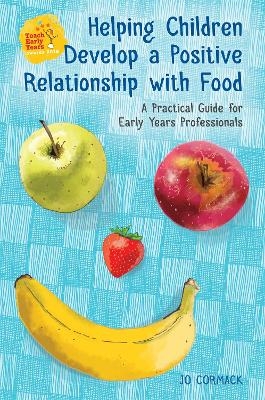
Helping Children Develop a Positive Relationship with Food
Jessica Kingsley Publishers (Verlag)
978-1-78592-208-4 (ISBN)
This practical guide enables those working with young children to better understand, manage and support children's relationship with food. Revealing the different ways in which children can relate to food, it gives accessible guidance and advice about how to help children to develop psychologically healthy eating habits and behaviours, and how to tackle feeding issues such as picky eating, obesity and food anxiety. Included is an easy-to-use reference section for trouble-shooting, which contains advice on how special needs such as autism can affect children's feelings about food.
Jo Cormack is a paediatric feeding consultant, registered counsellor, and doctoral student in feeding children at Bishop Grosseteste University. She runs the online blog Emotionally Aware Feeding, and is a mum of three.
Acknowledgements. Introduction. Section One: All about a good relationship with food. 1. What is a positive relationship with food and why does it matter? 2. Self-regulation. 3. The division of responsibility model. 4. Exposure and variety. Section Two: Under pressure. 5. What is a controlling feeding style? 6. Why is being controlling unhelpful? 7. Attention and praise. 8. Who knows best? Learning to trust children. Section Three: Food and feelings. 9. Understanding emotional eating. 10. Rewarding and punishing with food. 11. How we talk about food. 12. Reflecting on your own relationship with food. Section Four: Implications for practice - fostering a positive relationship with food. 13. Structure. 14. Content. 15. Serving family style. 16. Staff training. Section Five: Your food ethos. 17. The eating environment. 18. The social side of eating. 19. Modelling. Section Six: Nutrition and healthy eating. 20. Healthy eating and the EYFS framework. 21. Fun not fear - how to teach about nutrition. 22. Your food policy. Section Seven: Working with parents. 23. Being a team. 24. Empowering without blaming. 25. Understanding eating skills. 26. All about drinking. Section Eight: What we can do away from the table. 27. The power of play. 28. Helping children engage with their food. Section Nine: A closer look at picky eating. 29. Picky eating - is there really a problem? 30. What is behind picky eating? 31. Core principles when working with picky eaters. 32. Strategies to help picky eaters. Section Ten: Special cases. 33. ARFID. 34. Allergies and intolerances. 35. ASD. 36. Sensory processing. 37. Oral motor skills. 38. Obesity. Section Eleven: A case study. Nurture Early Learning, New Zealand. Final thoughts. Resource guide. References.
| Erscheinungsdatum | 01.02.2018 |
|---|---|
| Zusatzinfo | n/a |
| Verlagsort | London |
| Sprache | englisch |
| Maße | 152 x 228 mm |
| Gewicht | 320 g |
| Themenwelt | Sachbuch/Ratgeber ► Gesundheit / Leben / Psychologie ► Ernährung / Diät / Fasten |
| Sachbuch/Ratgeber ► Gesundheit / Leben / Psychologie ► Psychologie | |
| Medizin / Pharmazie ► Medizinische Fachgebiete ► Psychosomatik | |
| Medizin / Pharmazie ► Medizinische Fachgebiete ► Psychiatrie / Psychotherapie | |
| Sozialwissenschaften ► Pädagogik ► Vorschulpädagogik | |
| ISBN-10 | 1-78592-208-4 / 1785922084 |
| ISBN-13 | 978-1-78592-208-4 / 9781785922084 |
| Zustand | Neuware |
| Haben Sie eine Frage zum Produkt? |
aus dem Bereich


